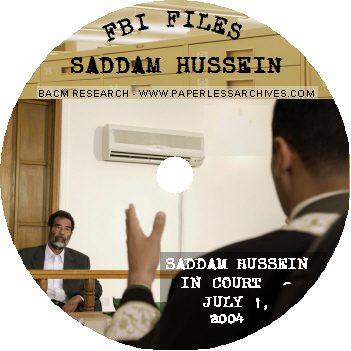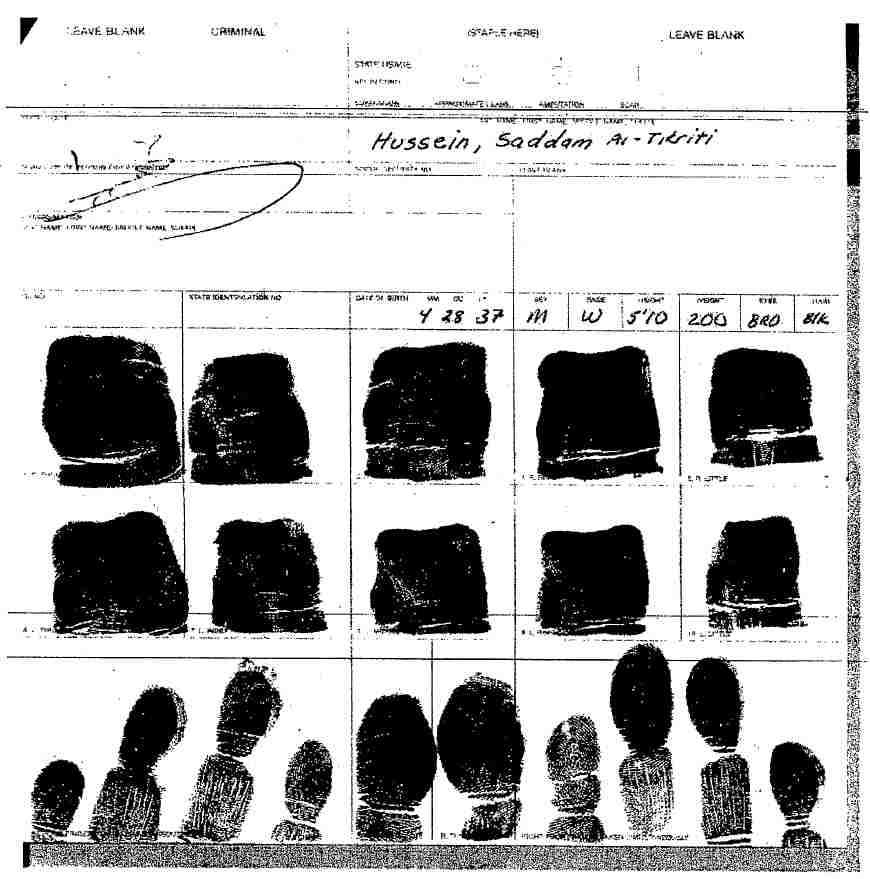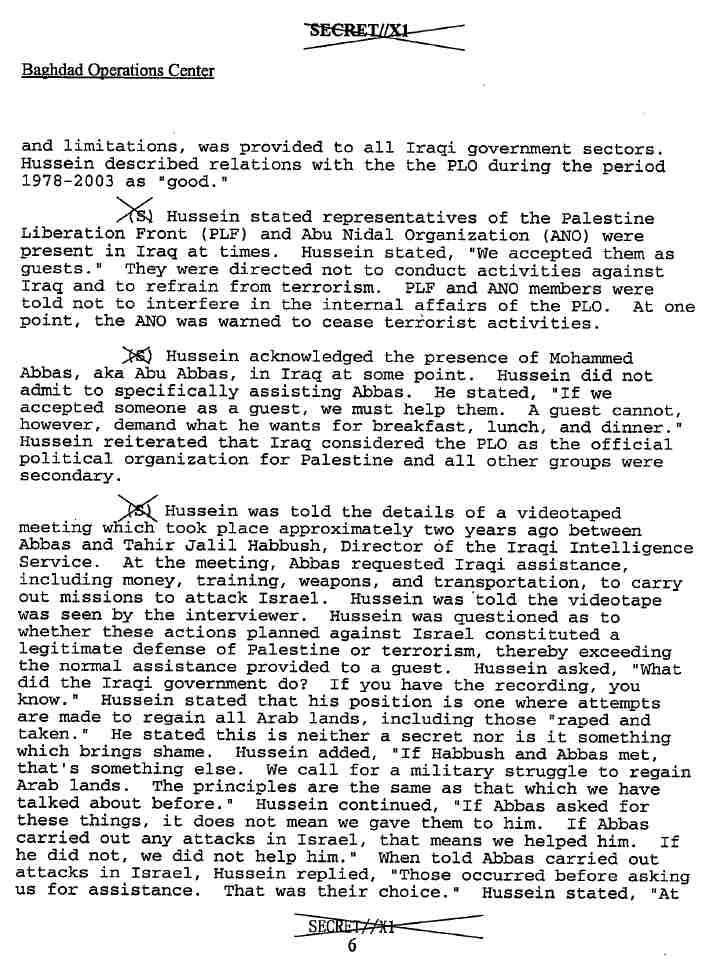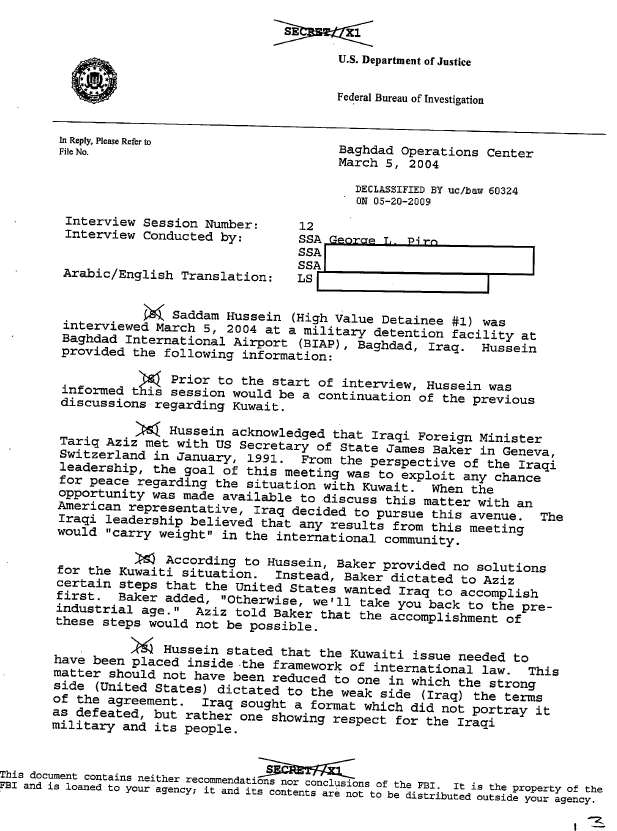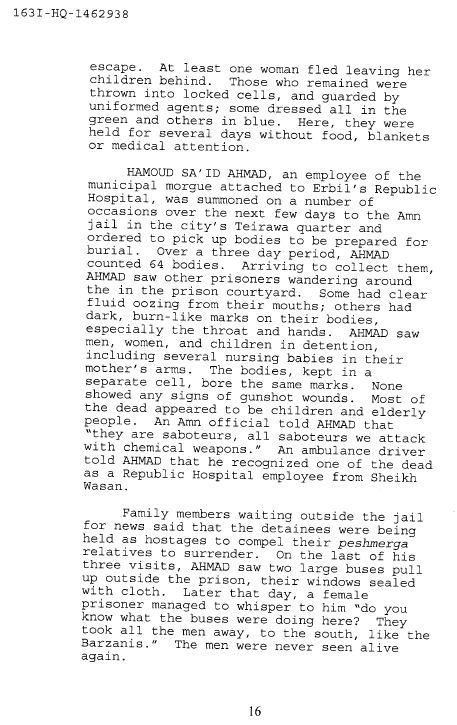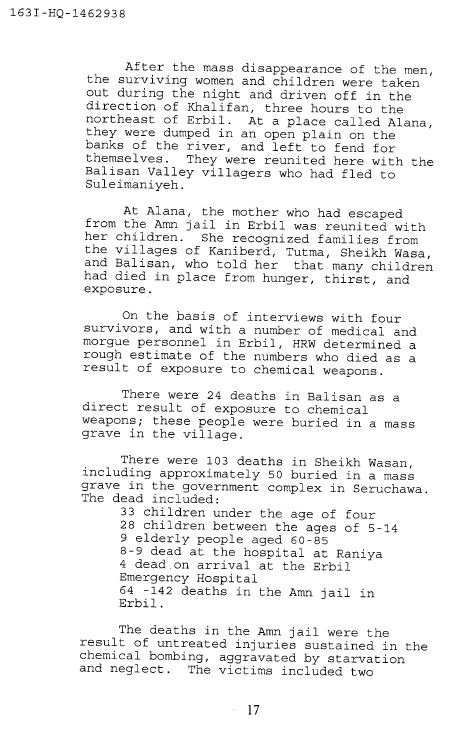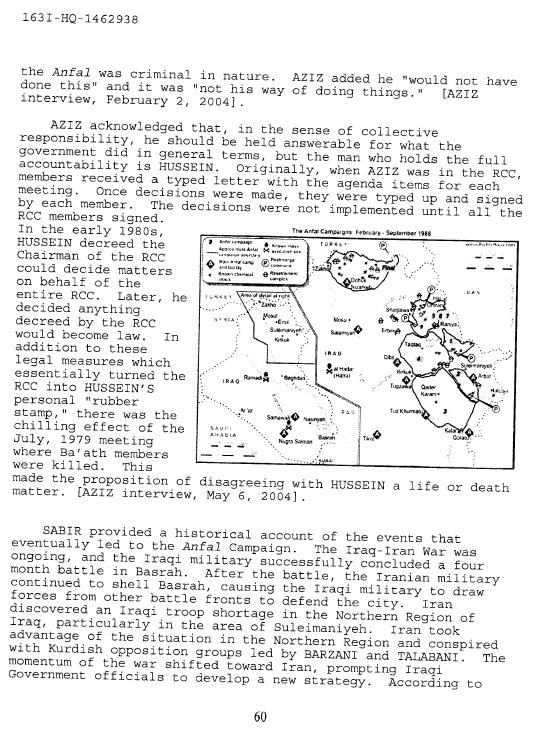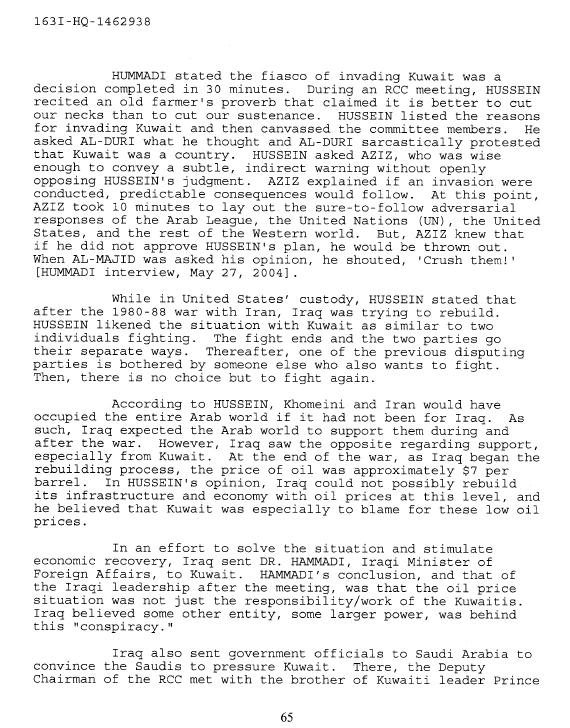|
Saddam Hussein Abd al-Majid al-Tikriti, referred to in FBI documents as "High Value Detainee #1," was born on April 28, 1937. He was the president of Iraq from July 16, 1979 until April 9, 2003. He was captured by U.S. forces on December 13, 2003. He was brought to trial under the Iraqi interim government set up by U.S. led forces. On November 5, 2006, he was convicted of charges related to the executions of 148 Iraqi Shi'ites suspected of planning an assassination attempt against him, and was sentenced to death by hanging. Saddam Hussein was executed on December 30, 2006.
FBI INTERVIEWS OF SADDAM HUSSEIN
131 pages of English language summaries from agents who interviewed Saddam Hussein, released by the FBI.
The FBI had Arabic speaking agents conduct twenty-five interviews with Saddam Hussein from February 2004 to the end of June 2004, in his detention cell at Baghdad International Airport. Twenty were formal interviews and five were "casual conversations." The FBI released documents related to 24 of the 25 interviews.
The lead interviewer was SSA George L. Piro. George Piro was a Supervisory Special Agent of the Federal Bureau of Investigation (FBI). The CBS television show "60 Minutes" revealed in January 2008 that he had gained the confidence of Saddam Hussein, while interrogating Hussein, during his imprisonment after the second war in Iraq. During his conversations with the former dictator, Piro reported that Hussein had not expected a U.S. invasion of Iraq.
Saddam Hussein told U.S. federal agents in 2004 that he allowed the world to believe he had weapons of mass destruction, because he did not want to appear weak to Iran. He even acknowledged, in a rare moment of regret, that he should have permitted the United Nations to witness the destruction of Iraq's weapons stockpile in 1991.
The former Iraqi president warned of what he called Iran's "fanatic" leaders. He denounced Osama bin Laden as "a zealot" and said he had no interactions with al-Qaida. However, he admitted meetings between bin Laden and Iraqi officials had taken place in the mid-1990s. Hussein said al-Qaida requested funding, but Saddam insisted his government had not co-operated. Piro wrote that Saddam said that if he wanted to cooperate with the enemies of the United States, he would have with North Korea, which he claimed to have a relationship with, or China.
During an interview Saddam refutes reports of having body doubles. He said he avoided his enemies by never using the telephone and constantly traveling from one home to another. He said the farm where he was captured in a "spider hole" was where he hid after participating in a failed 1959 coup attempt. Saddam discussed his rationale for attacking Israel with SCUD missiles in 1991.
The memos detail Hussein's reactions and denials when confronted with a documentary about atrocities committed in southern Iraq in 1991 in the aftermath of the first Gulf War. The interviews cover the 1968 take over by the Ba'ath Party and his 1979 ascent into the presidency. A well covered topic was the events leading up to the Iraqi invasion of Kuwait.
FBI PROSECUTIVE SUMMARY REPORT
This file, "Prosecutive Report of Investigation Concerning Saddam Hussein," was released by the FBI. A 94 page, March 10, 2005, FBI Prosecutive Report of Investigation concerning Saddam Hussein, which was delivered to the Iraqi Special Tribunal. The report is in support of Hussein's conviction for Article 11 – Genocide; Article 12 – Crimes Against Humanity; and Article 13 – War Crimes.
Subjects covered include: Halabja, March 1988 chemical weapons attack. April 16, 1987 chemical attack on Balisan and Sheikh Wasan. May 25, 1987 chemical attack on the Malakan Valley. June 6, 1987 chemical Attack on the Zewa Valley. Anfal Campaign of 1988. Anfal is the term used by the Iraq Government to describe its military campaign against the Kurds. 1991 invasion of Kuwait. 1991 Basra uprising. 1991 chemical weapons use in An Najaf. Al-Mahawil arrests and detentions. Al-Mahawil mass grave site. The report relies heavy on information provided by former Foreign Minister and Deputy Prime Minister Tariq Aziz.
The report is drawn from information from seized Iraqi government documents, reports from human rights organizations, interviews of top Iraqi officials by FBI agents while in American detention, and interviews of Iraqi civilians by Human Rights Watch.
In addition to interviews of former Iraqi leaders President Saddam Hussein and Tariq Aziz who was foreign minister (1983 – 1991) and Deputy Prime Minister (1979 – 2003), interviewees include:
Hamed Yousef Al-Hummadi, Hussein's Presidential Secretary.
Ahmed Hussein Khudaiyer, the Presidential Diwan.
Al-Majid, Nizar Al-Khazraji, Army Chief of Staff. Al-Majid is known as "Chemical Ali" because of the events at Dohuk.
Sa'ad Al-Din Aziz Mustafa, Chief of Staff and Staff General.
Mohammad Hamza Al-Zubaydi, senior Ba'ath Party official in the Northern Region.
Among the admissions cited from the interviews:
Al-Hummadi stated in a June 2, 1994 interview by the FBI that the phrase "special ammunition" meant chemical weapons, and that Hussein's order that the DMI (Iraqi Directorate of Military Intelligence) conduct a study of special ammunition usage, coupled with the order to, "Do the necessary, and notify us", indicated Hussein knew of and authorized his military commanders' proposed use of chemical weapons.
During a February 2, 2004 interview, Tariq Aziz confirmed that Hussein's decision to deploy chemical weapons against the Kurds was a unilateral one that is, Hussein did not convene a meeting of the RCC (Iraqi Revolutionary Command Council), National Assembly, or any other Iraqi or Ba'ath Party government entity to discuss the use of chemical weapons in the April, 1987 attacks. Moreover, Hussein gave no official written or verbal notification to these entities that he had authorized, or that chemical weapons had been used, in the attacks. Aziz stated the RCC was "informed" and "it was mentioned." He added it was "common knowledge" through the media that chemical weapons had been used. No RCC member protested their use for fear of reprisals from Hussein and fear that Iraq would lose the war without such a drastic step. At the time, the situation was viewed as dire and "life or death." Aziz admitted that Iraq and Iran had each violated provisions of the Geneva Conventions of 1917 and 1948, of which each was a signator, which prohibited the use of chemical weapons.
Tariq Aziz admitted during an interview that the first confirmed use of chemical weapons against a civilian population, anywhere in the world, occurred at Halabja, Iraq, in March, 1988. Although he agreed with speculation that the weapons may have been deployed to deter Iranian forces from occupying Halabja, he acknowledged that in fact the city was occupied by Kurds and not Iranians. Aziz stated that he learned more about the attack after watching a film on Halabja produced by the media, Aziz claimed not to know how many people were killed during the attack.
Al-Hummadi stated in an interview conducted by the FBI on May 27, 2004, that the fiasco of invading Kuwait was a decision completed in 30 minutes. During an RCC meeting, Hussein recited an old farmer's proverb that claimed it is better to cut our necks than to cut our sustenance. Hussein listed the reasons for invading Kuwait and then canvassed the committee members. He asked Izzat Ibrahim Al-Duri (Iraqi military commander and vice-president and deputy chairman of the Iraqi Revolutionary Command Council) what he thought and Al-Duri sarcastically protested that Kuwait was a country. Hussein asked Aziz, who was wise enough to convey a subtle, indirect warning without openly opposing Hussein's judgment. Aziz explained if an invasion were conducted, predictable consequences would follow. At this point, Aziz took 10 minutes to layout the sure-to-follow adversarial responses of the Arab League, the United Nations (UN), the United States, and the rest of the Western world. But, Aziz knew that if he did not approve Hussein's plan, he would be thrown out. When Al-Majid was asked his opinion, he shouted, "Crush them!"
ALI HASAN AL-MAJID AL-TIKRITI (CHEMICAL ALI)FBI FILES
53 pages of English language summaries of interrogations by FBI agents who interviewed Ali Hasan Al-Majid Al-Tikriti also known as Chemical Ali.
As a finding aid for this title, all convertible text in the documents have been transcribed and embedded under the page image as text. All text capable of being converted can be searched.
|
